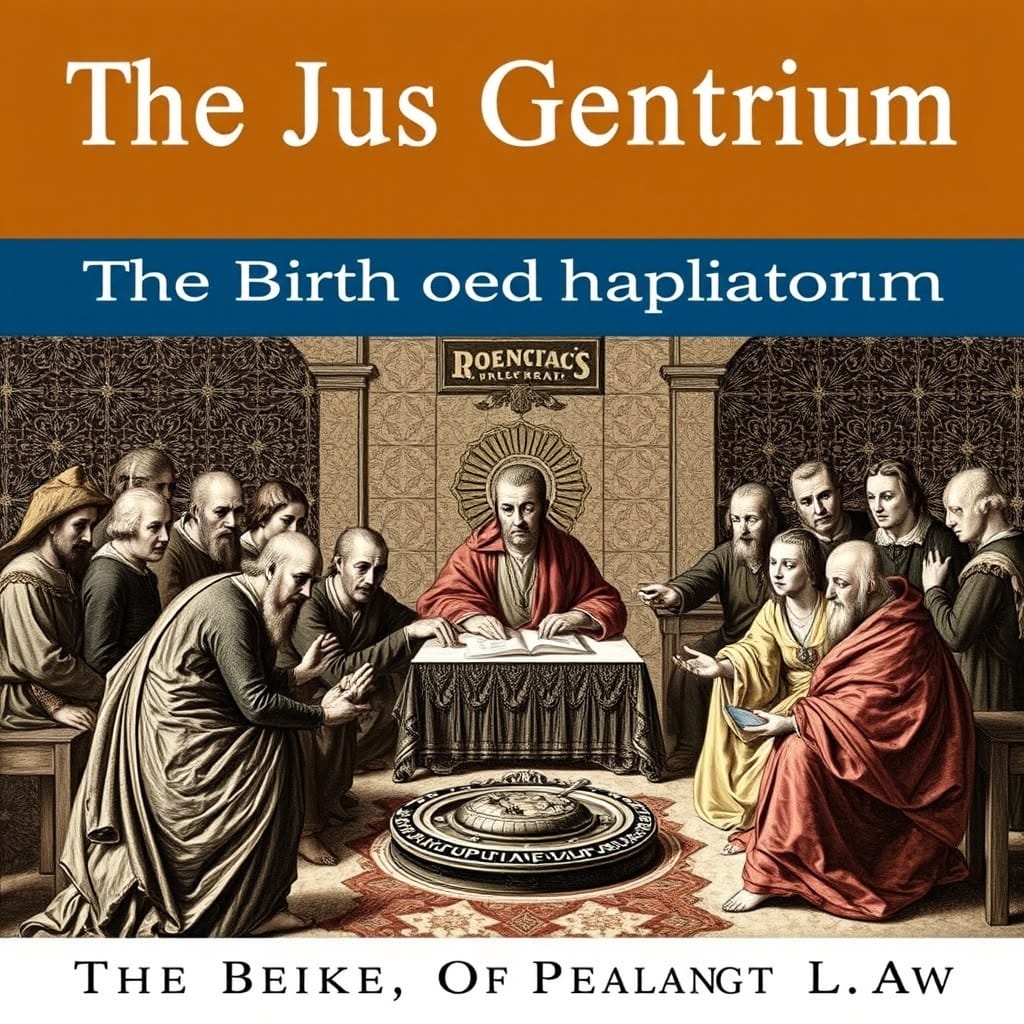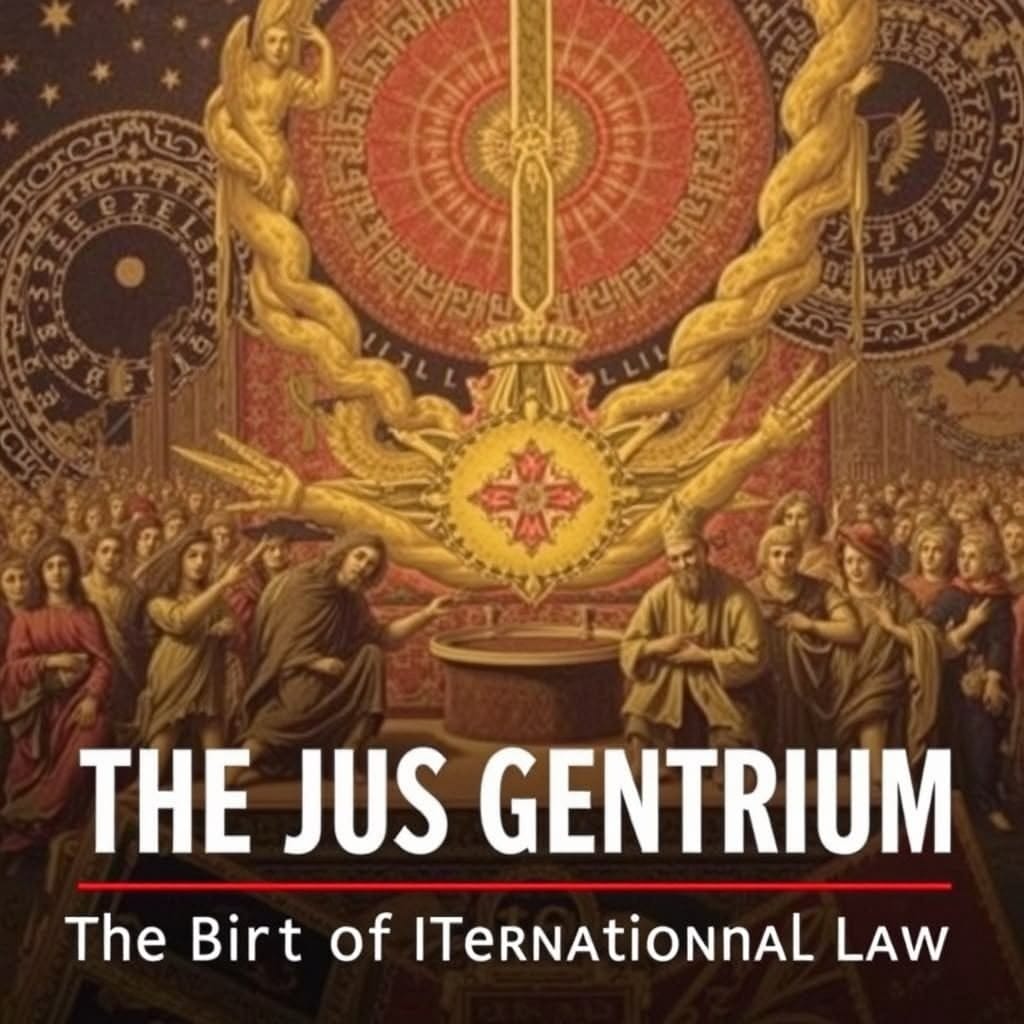Jus gentium, often translated as the “law of nations” or “international law,” refers to the legal principles that govern relationships between states and international entities. Rooted in natural law, it provides a framework for justice and order in international interactions.
During ancient Roman times, jus gentium played a pivotal role in legal systems by addressing the complexities of a multicultural empire. It allowed for the integration of diverse legal traditions and facilitated trade and diplomacy, as highlighted in Roman law.
Today, jus gentium’s influence is evident in modern legal frameworks that uphold principles of equality, sovereignty, and human rights. These fundamentals continue to guide international law, fostering a more orderly and just global community.
Origins in Ancient Rome
The development of jus gentium, or the law of nations, in ancient Rome occurred within a multifaceted legal environment that evolved significantly from the early Roman Kingdom through the Republic and into the Empire. The legal system was initially grounded in the Twelve Tables, which laid the foundation for Roman law. Over time, these basic principles were expanded by jurists and magistrates, creating a sophisticated framework capable of addressing the complexities of an expanding empire.
As Rome grew and interacted with diverse cultures, there arose a need for a legal framework that could effectively govern relations with non-Romans. This necessity led to the establishment of jus gentium, which sought to provide a common legal standard that transcended local customs and laws. It facilitated trade, diplomacy, and conflict resolution between Roman citizens and foreigners, thus promoting order in international relations.
Although specific historical examples of its early applications are scarce, jus gentium was instrumental in cases involving foreigners, reflecting the practical needs of a society engaged in expansive trade and diplomacy. This early application set the groundwork for what would become modern international law.

Roman Society and Foreign Interactions
The expansion of Roman territory brought the empire into contact with a multitude of diverse cultures and peoples. This expansion necessitated a robust legal framework to manage the complex interactions between Romans and foreigners. Roman law, initially rooted in the Twelve Tables, had to evolve to address these diplomatic and commercial engagements effectively.
The jus gentium, or law of nations, emerged as a key response to these challenges. It provided a common legal standard that transcended local customs, facilitating trade, diplomacy, and conflict resolution. This framework was vital in maintaining order and fairness in international relations, ensuring that foreign entities were treated with a sense of universal justice as derived from natural law principles.
Ultimately, the development of jus gentium was instrumental in shaping a legal system that could accommodate the needs of a cosmopolitan empire, influencing the evolution of modern international law.

Core Principles of Jus Gentium
The core principles of jus gentium, or the law of nations, are foundational to its universal applicability. These principles include universality, which ensures that jus gentium applies to all nations, creating a common legal framework that transcends individual state laws. This universality was crucial in Roman times, allowing for cohesive governance and interaction with diverse cultures within the empire.
Another fundamental principle is equality and fairness. Jus gentium posits that all states, regardless of size or power, are equal under the law. This principle helped maintain order and mutual respect in the Roman Empire, fostering cooperation and fair treatment of foreign entities.
The influence of jus gentium on later legal systems is profound. Its principles laid the groundwork for modern international law, shaping concepts of justice and equity that are now integral to global legal frameworks. By promoting universal rights and obligations, jus gentium has helped create a stable international order that continues to guide interactions between nations today.

Development Over Time
The evolution of jus gentium during the Roman Empire marks a pivotal moment in the history of legal systems. Initially, it served as a practical solution to manage interactions between Romans and foreigners, evolving to embody principles that transcended cultural boundaries. This progression highlighted the law’s universal applicability, laying a foundation for international legal frameworks.
As jus gentium matured, it was integrated into Roman legal codes, becoming an essential part of the judicial system. This integration ensured that interactions between diverse groups were governed by a coherent set of principles, promoting fairness and equality. The adoption of jus gentium into the Roman legal framework underscored its significance and adaptability.
Subsequent civilizations recognized the value of jus gentium and adapted its principles to their own legal systems. This adaptation facilitated the development of a more interconnected world, where legal concepts from Roman times influenced modern international law. As such, jus gentium remains a cornerstone of legal thought, guiding the evolution of legal systems across the globe.

Impact on Modern International Law
The jus gentium, or law of nations, has significantly influenced modern international legal frameworks. Its principles of universal justice and fairness laid the groundwork for contemporary laws that govern interactions between states. These foundational concepts continue to resonate in today’s global legal landscape.
Several key international laws trace their origins to jus gentium. For instance, the Geneva Conventions reflect its humanitarian principles, setting standards for wartime conduct. Similarly, the United Nations Charter incorporates the spirit of jus gentium by promoting peace and cooperation among nations. These examples highlight the enduring influence of Roman legal thought.
Comparing jus gentium with modern legal standards reveals a shift from natural law to a positivist approach. While jus gentium emphasized intrinsic justice, contemporary frameworks focus on state sovereignty and human rights through explicit agreements. Despite these differences, the core values of fairness and equality continue to guide legal systems worldwide, showcasing the lasting legacy of jus gentium.

Case Studies in International Law
Examining key international legal frameworks reveals the enduring influence of jus gentium. These frameworks illustrate the principles of universal justice and human dignity.
- Geneva Conventions: These treaties establish standards for the humanitarian treatment of non-combatants during armed conflict. They embody jus gentium by emphasizing human rights protection and humane treatment.
- United Nations Charter: This foundational document reflects jus gentium by promoting peace, security, and cooperation among states. It underscores the principles of sovereignty and equality, ensuring that all nations have equal rights under international law.
- International Treaties and Agreements: Various treaties, such as the Universal Declaration of Human Rights and the Vienna Convention on the Law of Treaties, reflect jus gentium’s influence. They establish norms for state conduct and advocate for global collaboration on issues like human rights and humanitarian law.
These case studies exemplify how jus gentium continues to shape the rules-based international order, fostering peace and cooperation globally.

Table of Key Historical Documents
Within the framework of international law, several pivotal documents reflect the enduring influence of jus gentium. These texts form the backbone of contemporary legal principles governing state conduct and human rights.
| Document | Description | Date |
|---|---|---|
| Geneva Conventions | International treaties that set humanitarian standards in warfare, ensuring protection for non-combatants. | 1949 |
| United Nations Charter | Foundational document promoting peace, security, and cooperation among nations, embodying the principles of jus gentium. | 1945 |
| Universal Declaration of Human Rights | Declaration affirming the rights and freedoms inherent to all human beings, influenced by jus gentium. | 1948 |
| Vienna Convention on the Law of Treaties | Framework outlining the rules for international treaty creation and interpretation, reflecting jus gentium principles. | 1969 |
These documents collectively underscore jus gentium’s lasting impact on the evolution of international law, demonstrating a commitment to universal justice and cooperation.
Pull Quotes from Legal Scholars
Although specific quotes from scholars on jus gentium are not readily available, its significance in the evolution of international law is widely acknowledged. Legal experts often emphasize the role of jus gentium as a foundational element in establishing universal legal norms. Its principles of equality and fairness are echoed in modern treaties and conventions.
One can infer from historical analyses that jus gentium served as a bridge between disparate legal systems, fostering cooperation and mutual understanding. This universal applicability continues to resonate in today’s international legal frameworks, underscoring its enduring impact on global jurisprudence.
Thus, jus gentium remains a critical subject of study for scholars aiming to understand the roots of contemporary international law.

Conclusion
The exploration of jus gentium reveals its pivotal role in shaping both ancient and contemporary legal systems. Originating in Ancient Rome, it facilitated interactions between Romans and foreigners, laying the groundwork for modern international law.
The enduring legacy of jus gentium is evident in its universal principles of equality and fairness, which continue to influence today’s legal frameworks. Its impact is seen in international treaties and agreements that govern state relations, echoing the foundational concepts first established centuries ago.
In final reflection, jus gentium stands as a testament to the evolution of legal thought, bridging past and present. Its principles are a cornerstone for legal scholars and practitioners seeking to foster a more just and equitable world. The journey of jus gentium from Rome to modern international law underscores its timeless relevance and profound influence.
Frequently Asked Questions
- What is jus gentium? Jus gentium, or the “law of nations,” was a legal framework developed in Ancient Rome to govern interactions between Romans and foreigners. It laid the foundation for modern international law.
- Is jus gentium the same as international law? While jus gentium served as a precursor to modern international law, they are not identical. Jus gentium was a Roman construct, whereas international law today encompasses global treaties and agreements among sovereign states.
- Why was jus gentium necessary in Roman times? The Roman Empire’s expansion brought increased interactions with diverse cultures, necessitating a legal system that facilitated fair dealings and resolved conflicts between Romans and non-Romans.
- Are there any misconceptions about jus gentium? One common misconception is that jus gentium was universally applied in the same way modern international law is today. In reality, its application was limited to areas under Roman influence.
- How did jus gentium influence later legal systems? Jus gentium introduced principles of equality and fairness, which influenced subsequent legal systems and contributed to the development of contemporary international legal frameworks.

